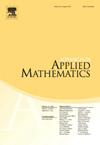一些特殊序列的弗罗贝尼斯数的组合方法
IF 1
3区 数学
Q3 MATHEMATICS, APPLIED
引用次数: 0
摘要
设 A=(a1,a2,...,an)是 ai≥2 的相对质正整数。弗罗贝尼斯数 g(A) 是不属于集合 {∑i=1naixi|xi∈N} 的最大整数。一般的弗罗贝尼斯问题包括确定 g(A)以及相关的西尔维斯特数 n(A) 和西尔维斯特和 s(A)。我们提出了一种解决弗罗贝尼斯问题的组合方法。基本上,我们将问题转化为一个更简单的优化问题。如果新问题可以显式求解,那么我们就可以得到 g(A)的计算公式。我们通过给出几个现有公式的简明证明和扩展,以及 g(A)、n(A)、s(A) 的新公式来说明这一想法。此外,我们还给出了 n(A),s(A),甚至更一般的西尔维斯特幂级数和的生成函数方法。本文章由计算机程序翻译,如有差异,请以英文原文为准。
A combinatorial approach to Frobenius numbers of some special sequences
Let be relative prime positive integers with . The Frobenius number is the greatest integer not belonging to the set . The general Frobenius problem includes the determination of and the related Sylvester number and Sylvester sum . We present a combinatorial approach to the Frobenius problem. Basically, we transform the problem into an easier optimization problem. If the new problem can be solved explicitly, then we obtain a formula for . We illustrate the idea by giving concise proofs and extensions of several existing formulas, as well as new formulas for . Moreover, we give a generating function approach to , and even to the more general Sylvester power sum.
求助全文
通过发布文献求助,成功后即可免费获取论文全文。
去求助
来源期刊

Advances in Applied Mathematics
数学-应用数学
CiteScore
2.00
自引率
9.10%
发文量
88
审稿时长
85 days
期刊介绍:
Interdisciplinary in its coverage, Advances in Applied Mathematics is dedicated to the publication of original and survey articles on rigorous methods and results in applied mathematics. The journal features articles on discrete mathematics, discrete probability theory, theoretical statistics, mathematical biology and bioinformatics, applied commutative algebra and algebraic geometry, convexity theory, experimental mathematics, theoretical computer science, and other areas.
Emphasizing papers that represent a substantial mathematical advance in their field, the journal is an excellent source of current information for mathematicians, computer scientists, applied mathematicians, physicists, statisticians, and biologists. Over the past ten years, Advances in Applied Mathematics has published research papers written by many of the foremost mathematicians of our time.
 求助内容:
求助内容: 应助结果提醒方式:
应助结果提醒方式:


